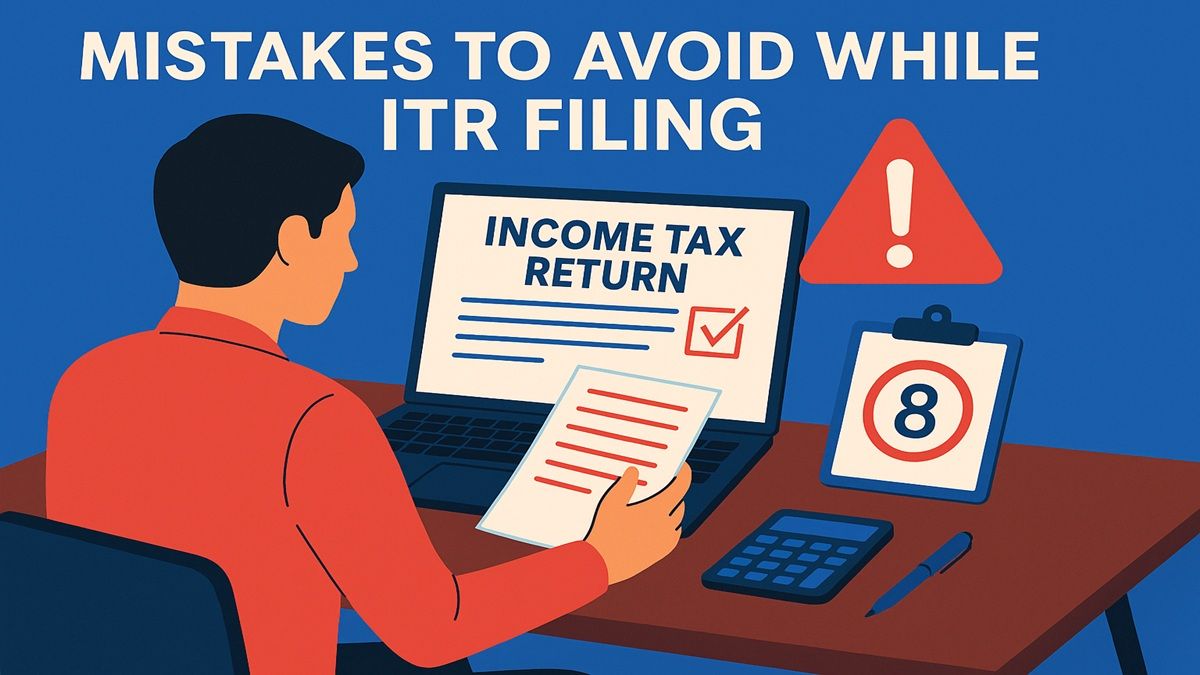TheFinQ.com is designed to be your one-stop destination for everything related to cards, loans, and investment products across India. We help you compare and choose the best financial products that suit your needs, including:

Filing your Income Tax Return (ITR) every year is a necessary responsibility for all taxpayers in India. But even a small error while submitting your return can lead to serious trouble later, like getting a notice from the tax department, a delay in the refund, or even a penalty.
This year, after Budget 2024, the tax rules have changed in many ways. The government has also extended the deadline for common taxpayers to 15 September 2025 instead of the usual 31 July, giving more time to file the return properly. But this extra time is only helpful if you use it wisely and avoid common mistakes.
Let’s look at 8 common ITR filing mistakes people often make and how you can stay safe from them this year.
Many people unknowingly select the wrong ITR form. If this happens, the income tax department may reject your return, or it could take a long time to process.
As per the new rules, if your long-term capital gains from equity or mutual funds are up to ₹1.25 lakh, you can now file using ITR-1. Earlier, you had to use ITR-2 or ITR-3. Filing the correct form as per your income type is now more important than ever due to the rule changes in Budget 2024.
Many people think that if their income is not taxable, they don’t need to file a return. But this is not true in every case.
For example:
In all these cases, filing an ITR becomes mandatory.
Even if your total income is below the taxable limit, filing a return helps you keep your financial records clean and updated. It also helps in faster loan approvals and visa processing.
This year, Budget 2024 introduced some big changes in capital gains taxation:
Also, a new cut-off date of 23 July 2024 has been added. You now need to report gains separately for transactions made before and after this date.
Another important update: Only Aadhaar Number will be accepted in ITR forms 1, 2, 3, and 5. Aadhaar Enrollment ID is no longer valid.
And lastly, the new tax regime is now the default option. If you wish to opt for the old tax regime, Form 10-EEA must be submitted before filing the return.
Your tax-related details such as TDS, advance tax, and other financial transactions are listed in your Annual Information Statement (AIS) and Form 26AS.
If you don’t check these before filing, you could miss out on:
Always match your data with Form 26AS and AIS. If there’s a mismatch, correct it first before filing. It will ensure:
Many taxpayers only mention income where TDS is deducted. But income from other sources also needs to be reported, such as:
Even if TDS is not deducted, this income must be included. If it’s not reported, and the tax department finds out later through AIS or other data, you may face additional tax, interest, or penalties.
Some income is exempt from tax, but you still need to report it properly under the right section. This includes:
Not reporting these in your ITR can make your return incomplete or defective. If you don’t correct it on time, the return can even be considered invalid.
If you changed jobs during the financial year, you must collect Form 16 from all employers and include income from both.
Here’s what usually goes wrong:
If you miss adding old job income, you may receive a notice later or be charged a penalty for wrong return. Always combine income from all jobs in one ITR.
In the old tax regime, if you claimed House Rent Allowance (HRA), you must submit valid proof such as:
If these are not submitted or wrong details are given, your claim may get rejected, and a tax notice may follow. Always keep all documents ready in case of verification later.
The ITR portal is now more user-friendly, and new pre-filled forms have made the process easier. However, you must stay careful and follow the new rules set after Budget 2024.
Simple steps like choosing the correct form, declaring all income, and checking Form 26AS and AIS can help you avoid big issues.
If you feel unsure about any part of the filing, consult a tax professional or a CA. Remember, a mistake today can become a costly problem later.
Disclaimer: This article is for general informational purposes only and does not constitute professional tax advice. Please consult a certified tax advisor before filing your ITR.
Source: Financial Express